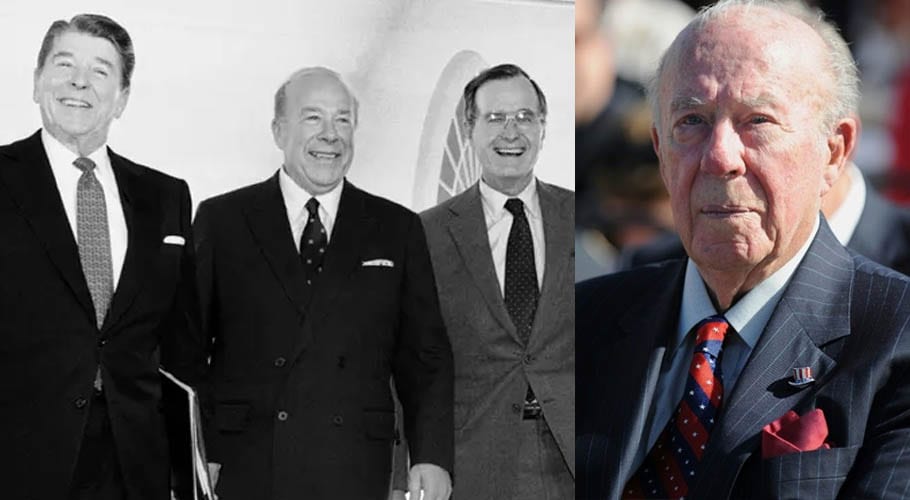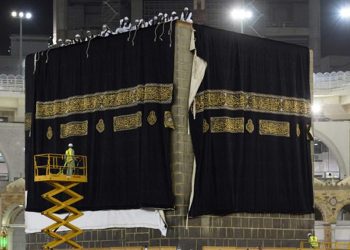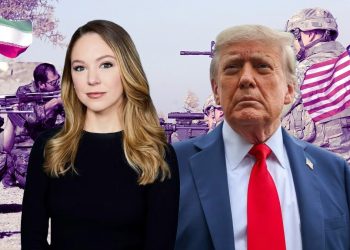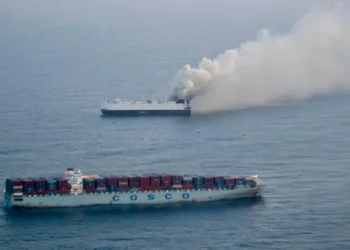WASHINGTON: Former US Secretary of State George P. Shultz, who played a central role in helping to bring the Cold War to an end as President Ronald Reagan’s secretary of state, has died at age 100.
Shultz, who was one of only two Americans to have held four different federal cabinet-level positions throughout his long career, is best known for leading the State Department under Reagan.
He also served as secretary of the Department of Treasury, secretary of the Department of Labor and director of the Office of Management and Budget during President Richard Nixon’s administration.
His work in presidential administrations extended back to President Dwight D. Eisenhower, when Shultz worked as a senior staff economist on his Council of Economic Advisers during the 1950s.
“Our colleague was a great American statesman and a true patriot in every sense of the word. He will be remembered in history as a man who made the world a better place,” former Secretary of State and Director of the Hoover Institution Condoleezza Rice said in a statement.
Shultz, who was awarded the Presidential Medal of Freedom in 1989, had been working at the Hoover Institution for over thirty years until his death. He died at home in California. The cause of death was not given.
President Joe Biden said “few people did as much to shape the trajectory of American diplomacy and American influence in the 20th century” as Shultz. “I regret that, as president, I will not be able to benefit from his wisdom, as have so many of my predecessors,” Biden said in a statement. Secretary of State Antony Blinken described Shultz as a “legend” and a “visionary.”
In the Reagan White House, Shultz was one of the least controversial figures, cultivating cordial ties with Congress and the press and backing from the president himself, who kept Shultz as his top diplomat for six and a half years.
In early 1983, half a year into his tenure, Shultz returned from China to Washington and was invited to a casual dinner at the White House where he was intrigued to hear the president sound eager to meet the Soviets. Days afterward, Shultz brought the Soviet ambassador to the White House in an unmarked car for a secret meeting with Reagan.
In 1985, Mikhail Gorbachev ascended to the helm of the Communist Party, and Shultz joining then-vice president George HW Bush flew to Moscow and met him at the funeral of his predecessor Konstantin Chernenko.
Shultz immediately detected opportunities with Gorbachev. Shultz’s approach with Gorbachev encountered deep skepticism from Defense Secretary Caspar Weinberger and CIA chief Bill Casey, but Reagan overruled them.
By 1987, Reagan and Gorbachev signed the landmark Intermediate-Range Nuclear Forces Treaty. The Soviet Union soon began disintegrating after Gorbachev initiated liberal reforms and dissent grew.
Shultz later played down Gorbachev’s role, pointing to underlying weaknesses in the Soviet system and crediting the US leader’s massive boost in defense spending. He also hailed European allies, especially West Germany, that defied public protests against NATO missile deployments in the 1980s.
Shultz also took on challenges in the Middle East having brokered an agreement between Israel and Lebanon in which Israel agreed to start withdrawing troops. He made headlines during the 2016 election when both he and former Secretary of State Henry Kissinger declined to endorse either major party candidate.
Declaring Iraq to be a “rogue state,” Shultz said Saddam Hussein’s overthrow was crucial “for the integrity of the international system and for the effort to deal effectively with terrorism.”
While secretary of state, Shultz’s policies in the Middle East were more moderate. He repeatedly clashed with ally Israel, especially over Lebanon, and opened contacts with the Palestine Liberation Organization. In an essay for his 100th birthday in 2020, he bemoaned the style of Donald Trump, saying that the United States could succeed only if others trust it.



































